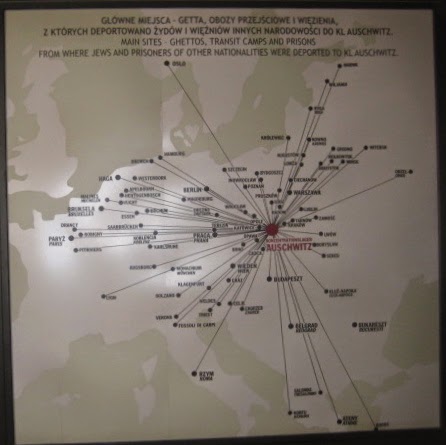We arrived here from New York City earlier in the week -- details to follow. I was struck by this map, which shows the relationship of the city of Oświęcim, Poland, to the rest of Europe. It is displayed in the Auschwitz-Birkenau State Museum. The city and in particular the concentration camp are known as Auschwitz in German, and so today the word "Auschwitz" refers primarily to the concentration camp.
The sites listed in black are "ghettos, transit camps, and prisons from where Jews and prisoners of other nationalities were transported to KL Auschwitz." Such transportation lines (particularly train lines) to Oświęcim existed before the German invasion. Notice the well-known Polish cities Warsaw and Krakow on this map.
This illustrates that although Oświęcim is a small town, its location at the intersection of these train lines meant the Nazis sent people from all over Europe.
There is much more to say. For now, let the simple difference between the Polish and German names for this place remind us that this town existed before World War II and continues to exist today. The atrocities that occurred here did not require some inhuman, unusual construction of a place unlike any other, a place not capable of any other purpose. Rather, for the sake of efficiency among other purposes, the evil of the Holocaust, including the killing of 1.1 million human beings, was committed in a place that was previously normal, with its own prior history and with its own present.
The rest of the map, in more distant perspective, shows its relation to other familiar cities, including Rome, Paris, Oslo, and Budapest, though of course this photo is not the best.

